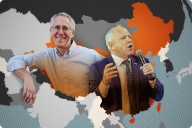You have /5 articles left.
Sign up for a free account or log in.
George Mason University’s Board of Visitors has authorized the university to move forward in establishing a campus in Songdo, South Korea. This will be the Virginia university’s second attempt to establish an overseas branch: its first, in the United Arab Emirates, ended in failure. The university devoted three years to developing a degree-granting campus in the Ras-Al-Khaimah province only to withdraw in 2009 due to slow enrollment growth, funding difficulties, and disagreements with the U.A.E. government body that was financing the campus.
“I would say that the evaluation stage of the Songdo campus opportunity was made stronger by lessons learned,” said Anne Schiller, George Mason’s vice president for global strategies and a professor of anthropology. Schiller came to Mason in 2009 and was not there when the U.A.E. campus was developed.
“I wouldn’t say it became clear that we wanted to involve lots of stakeholders because we would have anyway, but I do think that there was perhaps broader consultation and input than with the campus in the Emirates," she said. “But the Emirates campus comes up as a recurring theme, and I will say that although that campus had to close, it was an important step that Mason took [in opening it]. It said something about Mason wanting to be out in the world, to have a visible global presence."
George Mason now plans to be a part of Songdo Global University Campus, under construction on land reclaimed from the Yellow Sea in the Incheon Free Economic Zone, which aims to be an educational and high-tech hub. The goal of Songdo Global University is to have 10 different foreign universities operating on a single campus. Each institution will operate independently but will collaborate in offering general education classes, for example.
“It will be a mecca for convergences,” said Heeyhon Song, CEO of the Songdo Global University Foundation, which is constructing the campus. Song said he hopes that the campus population will ultimately be 40 percent Korean and more than 20 percent American (consisting of students on study abroad programs), with the remainder coming from the rest of the world.
“Our dream is that Songdo Global University becomes a center for East-West intellectual and cultural exchange,” Song said.
The Songdo Campus
Songdo Global University is heavily subsidized by the Korean government. Participating foreign universities have each received a $1 million planning grant to study the feasibility of opening a campus in Songdo, and generous subsidies to support a campus in its first five years of operation. These subsidies take the form of cash ($1 million per year), rent-free use of facilities -- including faculty housing -- and free utilities. Mason's rent-free period has been extended from five to seven years.
The State University of New York at Stony Brook was the first – and so far only – university to move in. Stony Brook’s Songdo location began operating in March with an enrollment of 35 students in four master’s and Ph.D. programs in two fields -- computer science and technology and society. The plan is to launch a first undergraduate major, in technology and society, this spring, and to phase in other undergraduate majors in computer and information science after that. Programs in mechanical engineering are also planned.
“Our working model has been to open with graduate programs and then move to undergraduate programs,” said W. Brent Lindquist, a professor and chair of applied mathematics and statistics at Stony Brook, where, in his former position as deputy provost, he oversaw development of the Korea branch. “We’re very much interested in this being a research university.” Lindquist said that Stony Brook has received a $10 million grant from the equivalent of South Korea’s National Science Foundation to provide support for doctoral students.
Universities that are moving ahead with plans for campuses:
- The State University of New York at Stony Brook (already operating)
- George Mason University
- University of Utah
- Ghent University (Belgium)
Other universities that are moving ahead with planned campuses in Songdo are Ghent University, in Belgium, and the University of Utah, which is currently conducting a feasibility study. A number of other American universities that were originally interested in opening a campus in Songdo have dropped out, including North Carolina State University – which in 2010 announced it was indefinitely suspending planning for a Korea campus -- and the Universities of Delaware, Missouri at Columbia, and Southern California.
Delaware decided not to proceed with a Songdo campus in 2010. “We did a feasibility study and the financial projections were just too bleak,” said Andrea Boyle Tippett, a university spokeswoman. “We surveyed students in the Mid-Atlantic region, and also students and parents in China and South Korea. There was a good deal of interest, but there was also a question about how much they would be willing to pay. We did several different projections and couldn’t make the break-even point.”
In order to break even, Delaware would have had to price itself higher than the top universities in China, Hong Kong, Japan, Singapore, and South Korea, Tippett said.
Mason’s Korea Campus
In its planning process, George Mason has identified interest on the part of Chinese and Korean students. Residents of both countries have demonstrated a strong demand for American higher education: Chinese and Korean students make up the first- and third-largest groups of international students in the United States. South Korea is, however, experiencing a long-term decline in its youth population.
Mason is in the process of applying for approval from South Korea’s Ministry of Education, Science and Technology, and hopes to attract 80 students in two majors – economics and management – when the campus opens in the spring of 2014. Additional undergraduate programs in global affairs, conflict analysis and resolution, computer game design, and environmental sciences, as well as graduate programs, will be phased in. Tuition will be set at $20,000.
“One of the great attractions of this, aside from the obvious attractions of Korea and the exiting opportunities that [the location] can pose for our students and our faculty, are the collaborations we can build,” said Schiller, Mason’s vice president of global strategies. “It’s exciting to be part of a new alliance model for foreign universities.”
In February, George Mason’s Faculty Senate endorsed the Korea campus on a 19-7 vote with two conditions: that the deans of the colleges and schools offering programs confirm that the proposed course sequences meet that college’s/school’s requirements and that the senior vice president for finance certify that the program is expected to be self-supporting and financially viable beyond the initial subsidy period. June Tangney, a professor of psychology and chair of the Faculty Senate, said that both conditions have been met and the Faculty Senate does not have any additional concerns.








